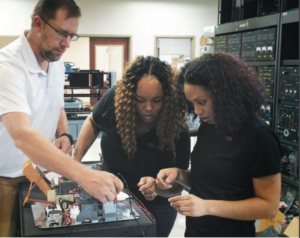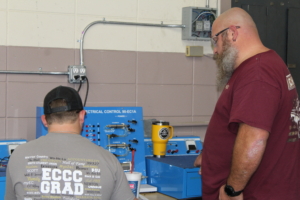Dedicated educators work to improve the quality of postsecondary career and technical education (CTE) in many ways. At Mississippi State University (MSU), in 2020, President Mark Keenum felt called to act. You see, Keenum is a community college graduate. And he felt MSU could do more for its stakeholders.
Develop partnerships to meet the needs of educators and the workforce.
For learners interested in the applied sciences, an associate in applied science (AAS) was once considered the terminal degree. But in 2023 and looking forward, many related industries need higher-level skills in the workforce. Thus, Keenum proposed creating a new degree program: the bachelor of applied science (BAS) at MSU.
Education leaders responded by soliciting feedback from community college and industry partners to gauge the most critical workforce needs and consider labor market projections. MSU then developed areas of emphasis for BAS degree programming that included advanced manufacturing, trades supervision, public management and cybersecurity.

New degree programs like MSU’s BAS can expand the CTE pathway ecosystem in a manner that is responsive to industry needs for more management-ready graduates in all career clusters (Goger, 2019). Further, opportunities to develop and validate new skills will benefit postsecondary CTE faculty as well as community college students in high-quality CTE programs. In fact, as the MSU’s BAS program has matured, university administration has begun offering tuition discounts for postsecondary CTE instructors to incentivize their enrollment. Mississippi State recognized that postsecondary CTE faculty are vital in the development of tomorrow’s workforce. With a reduced financial barrier, more CTE educators will seek to obtain advanced degrees (Giancola >amp; Davidson, 2015).
Postsecondary partnerships promote success.
Community and technical college faculty who engage in MSU’s BAS degree programs gain new and relevant skills as their fields evolve. These efforts toward continuing education also provide validation of the merit of career and technical education pathways. This sentiment is echoed by CTE leaders at Mississippi State’s partner schools, including Dwayne Casey, associate vice president of workforce solutions and CTE, and Katie Broadway, director of CTE and program advancement, at Northwest Mississippi Community College (NWCC). Faculty enhance their own technical skill development, and they also may learn new instructional methodologies to use in their courses.
Postsecondary partnerships support access >amp; equity goals
Educational entities should strive to work cooperatively to build a dynamic educational ecosystem that can adapt. Also, they should create learning environments that promote equity and inclusion for all. Casey and Broadway view their partnerships with MSU as a way to reduce the stigma of CTE. They also agreed that the BAS degree has expanded education options for their CTE faculty and students in a way that was not available in the past. Another unintentional, positive effect of this partnership work: It has helped bolster community colleges’ CTE recruitment efforts by demonstrating that a postsecondary CTE degree is and always has been on par with other academic degrees.

Takeaways
Creating purposeful partnerships with community colleges and universities is one strategy CTE leaders can use to meet the demands of a dynamic landscape in 2023 and beyond. Educators at all levels must have the humility to be introspective. Evaluate current offerings to ensure that programs provide value to everyone involved.
After engaging in such reflection, Mississippi State University created the BAS degree to strengthen its postsecondary partnerships — fully embracing its mission to provide opportunity to all citizens. MSU seeks to provide value in creating a resilient workforce, meeting students’ needs so they might be prepared to meet the industry’s needs. Further, granting this access to educators will convey to their students the value of continued education.
Sean Owen, Ph.D., is director of career and technical partnerships at Mississippi State University overseeing the BAS degree program. Previously, he led Mississippi’s statewide CTE assessment initiatives. And he also served as president of the Consortium for Research on Educational Assessment and Teaching Effectiveness.








